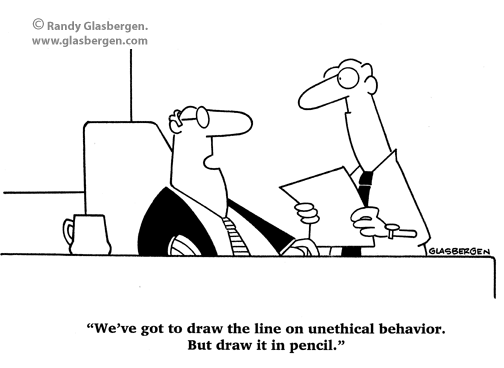 |
| credit: hrintel.blogspot.com |
Enron and WorldCom have become the
benchmark of what businesses should not do in the course of doing business.
They are also example of the way things have been done by many business with a
hazy approach of ethics.
Accountants are, by and large, an
honest and hardworking lot, and accountancy is a by the book profession. Ethics
is part of the extended role of the profession. There is a definite need to
learn from the past, build positively on these experiences and continue to develop
and follow best practices.
The accounting profession is
characterised as being subject to many rules and regulations. Accountants are
seen to be at the financial forefront and are expected to exhibit more
professional ethics than anybody else as part of their professional
responsibilities. Before, it may have been sufficient to report transparently,
it has now become necessary to operationalise transparency on day-to-day basis.
It’s tedious, but necessary. In the long term, it will build trust between
accountants and other stakeholders.
What was a necessity 20 years ago is
not sufficient today. Technology is changing the way business is done.
Accountants, like everyone else, need to be tech-savvy. Business today is being
transacted at a faster pace and in larger volumes than ever before. Technology
helps business and the people who runs them keep up. But technology is only an
enabler. It cannot replace the quintessential basics of accounting (or any
profession, for that matter), and it is only good as the people who use it.
Ironically, the one element that has
never change despite commercial and industrial dynamic is ethics. More
specially, the application of ethics to business practise. Ethics and integrity
will always come back to bite those who dared ignored them - more often than
not, in the form of public opinion which influences various stake holders and
ultimately affects the company values. Ethics and integrity are not college
courses, unfortunately, they are subjects examined by public scrutiny.

Integrity enforces ethics. There need
to be recognition of what is ethical and what is not. The line between personal and professional ethics is a very indistinct
one. “Being ethical” is perhaps
best described (by Socratic ideal) as ‘not
the person who knows the right, or who chooses that right, but the person who
does that right as a habit of living’. Ethics
is the knowledge of what is right; integrity is the strength of will that keeps
one operating within those parameters. There cannot be one without the
other.
Complacency in any aspect of business
is a death knell. Globalisation means the world is shrinking. Businesses need
to be more transparent, that shareholders want better accountability; that if
accountant stay fixated on self-regulation but only pay lip service to it, the
authorities will step in and wield that big regulatory stick themselves, for
the public good.
Accountancy has been about innovation
over many years but has always tended to be stereotyped as stodgy and dull. With
the call for more ethics among members of the profession, another aspect of the
issue comes into play. Public expectation have increase but actual delivery
services may not be in parallel. Inefficiencies are only now being flushed out.
Resources are limited and accountants
are finding now that they have to go into areas where they have traditionally
not gone before. They have to report on how money is being spent, but are
encountering opposition because while they do have the authority to make the
financial decision, they are not the ones who have to make the heed, sometimes
life and death decisions. More will be expected of the accountants that just
the ability to crunch numbers. They will have to exhibit both professional and
personal integrity and willingness to comply with rules and regulations imposed
by third parties on a profession that has been quintessentially self-regulating.
They have to convince their stakeholders of their integrity, and that their
every action complies with the amorphous standards of what is ethical.
The role of the accountants cannot be
looked at in isolation of everything else in the world, with the accounting
profession, you either follow the stringent criteria or you don’t. Accountants
have a lot of compliance to put up with.
Things change, people change,
environment change. The ones who survive and those who astute enough to grasp
this, and versatile enough to effect that change.
Interview with Dennis Yates (ACCA President)
By Dato’ Raymond Liew and team
Accountants Today
November 2006
No comments:
Post a Comment